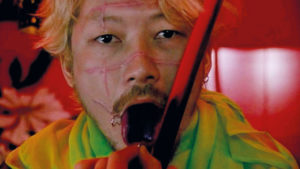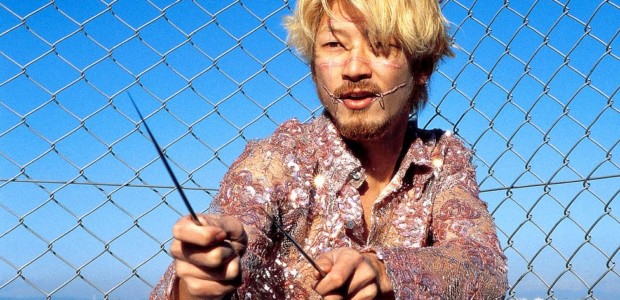I grew up in rural Virginia. I was a teenager in the early 2000s, realizing pretty early on that I was attracted to both males and females. The internet was pretty limited at the time, and even more so where I lived. It was just a forgotten corner of the world: farms, fields, the Chesapeake Bay and limited connectivity to more socially progressive spheres. A place where staying in the closet feels like the only real choice. My refuge was in film. Any would do, but horror was (and still is) my favorite. Whenever we would drive an hour north to go shopping, I would spend long days pouring over Fangoria or digging through the stacks of a video store. Luckily for me, the movie store in the mall had a pretty loaded horror section. I would enter with a hand-written list of titles, and I would leave with a stack of DVDs and a smile.
One week, ICHI THE KILLER (2001) was in that stack. As usual, I would pour over the cases on the drive home, playing my mind’s conception of the films over and over in my head. The protagonist of ICHI THE KILLER is a bisexual, sadomasochistic killer named Kakihara. He cuts a strong image: a blonde-haired, facially-scarred Tadanobu Asano. His face is the sole cover of the DVD for the film, with a red background.

Imagine my surprise when it turned out that this dude I thought looked cool as hell turned out to be bisexual.
Kakihara’s boss has gone missing. In reality, he’s been murdered by the titular Ichi, but Kakihara holds out hope that his boss is still alive somewhere. Other characters try to tell him that the boss is most likely dead, but Kakihara refuses to believe this without evidence. This is because Kakihara is in a sadomasochistic relationship with his boss. He has a sexual need that has only, to this point, been fulfilled by this man. Later, after Kakihara is convinced that his boss is in fact dead, he entertains having a relationship with the boss’ girl. After a spirited session in a room of chains and swinging lights, Kakihara is disappointed and storms off. She didn’t fulfill his need, and he has to look for it elsewhere. This search for pleasure eventually lands on Ichi, who he believes will give him what he seeks.
While I won’t lie and say that I’m not a masochist, it’d be silly to put it on the same level as Kakihara. Instead, I saw in Kakihara a kinship in the search for connection and pleasure across gender lines. Male or female doesn’t matter to Kakihara, only the connection between two people and mutual enjoyment. As he tells someone who is trying to fight him: “There’s no love in your punches.” Outside of his sexuality, Kakihara was also a tough guy who wouldn’t take shit from people. At small slights, he’d lash out. People would generally not discuss his sexuality in front of him, since anyone who appeared to be mocking him would encounter a bad end.
This was appealing to young me because I was always afraid of what people would think of me. Once word spreads about you in a rural area, generally it sticks. Or it can even mutate into other rumors and gossip. Watching this blonde-haired, crushed-purple-velvet-suited yakuza live out loud was awe-inspiring. Teenage me thought that Kakihara was some kind of bisexual ideal. It blinded me to the negative aspects of his portrayal. I felt like someone who wandered in the desert and found an oasis. I had never seen a bi character be portrayed as anything but a joke. Most bi characters at the time were either “unsure” if they were actually straight or gay, or were the butt of jokes about hypersexuality. To see a character be considered in a serious way while also being unapologetically bisexual was a revelation.

I still wasn’t ready to live it out, but I did feel seen and understood. I could watch the movie with friends and judge their reaction to the character. I learned who I could trust with my secret through films. Slowly, I started to tell people that I was close with. I was lucky in that all my close friends were cool with it, and always have been since I started being honest about it. It would be years before I would be loud and open, but Kakihara was one of the first pieces of the puzzle. As the years wore on, I would return again and again to ICHI THE KILLER. As I grew older and wiser, I started to see the cracks in the facade of what I had once canonized as the apex of bi representation.
Kakihara himself is a trope: the depraved bisexual. As cool as he seemed to teenage me, he was still an incredibly violent and dangerous person. He tortures people with no remorse. He does some of the most sickeningly violent things in this film, either by his own hand or through his underlings. While well made, the film can be deeply ugly and it’s a more difficult watch for me now than it was as a curious teenager. I still believe that Kakihara has positive aspects of bi representation, but it’s far from perfect. The belief in finding someone for you regardless of gender still hits me hard, but it’s tempered by the horrific violence and the joy he feels from causing catastrophic pain. His fearlessness from judgment over his sexuality is commendable, but his willingness to sacrifice everyone else for his libido is troublesome. For every positive, a negative. But still, my eyes are always drawn to the blonde-haired man in the crushed velvet suit.
Watching the film now is like looking at high school photographs. I can only attach meaning to the memories in an abstract way, it’s a picture of a person who doesn’t exist anymore. Kakihara is like a ghost of my teenage years captured forever in celluloid. The film is a window into a time that’s long since passed. It’s remembering a long gone lover: I’m happy they were a part of my life… But it couldn’t last forever.


No Comments